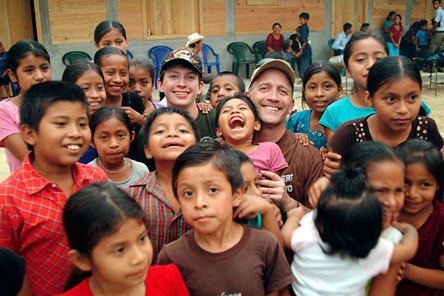GUATEMALA — Close to a dozen Marysville and Everett Rotarians spent roughly a week in March building schools for villagers in Guatemala, and the volunteers included a variety of returning Rotarians and first-time visitors to the Guatemalan municipality of Barillas.
Marysville dentist Dr. Kelly Peterson and his 17-year-old son Michael were among the area volunteers who teamed up with the Everett-based Hands for Peacemaking Foundation to help construct a three-room school building in the village of Nuevo Cuchumatan, followed by a one-room school building in the village of Montequino.
Michael was the youngest American member of the construction crew, and this was his first trip to Guatemala. By contrast, Marysville Rotarians Harv and Larry Jubie and Terry Earnheart, the latter of whom also serves as president of the Hands for Peacemaking Foundation, have each made close to a dozen such trips to Barillas.
Although the Rotarians arrived in Guatemala March 12 and returned to the United States March 21, both schools were built in five days at a total cost of approximately $30,000, including furnishings and educational supplies. Most of the rest of the Rotarians’ time was eaten up by extended drives between villages, sometimes as long as 12 hours in a single day, over gravel and dirt roads. Once the Rotarians reached their destinations, they didn’t have the luxuries of either drinkable water or electrical power, so they had to bring multiple five-gallon jugs of water and their own generators to power their tools.
Larry Jubie, District Governor of Rotary District 5050, noted that the midday temperatures reached 112 degrees, and credited the villagers with performing the concrete construction work before the Rotarians’ arrival, pitching in during the Rotarians’ building and completing the tin roofs by themselves. Peterson added that the villagers prepared the sites by digging into the sides of hills by hand, without tractors.
“They helped quite a bit with the manual labor,” Kelly Peterson said. “It gave them a sense of ownership and accomplishment.”
“I’m used to the weather here, so to go into that much humidity with 100-degree temperatures was tough,” said Michael Peterson, who learned to take “military showers,” due to the scarcity of water, and came to regard private outhouses as a “perk.” “But the people there are in such need that it motivates you.”
Larry Jubie pointed out that for a population whose average daily income is about $2, the $30,000 price tag for the two schools was a lot of money, which was why the villagers were willing to haul in supplies and help with the construction, in lieu of supplying any money themselves. He described the children and the adults as very appreciative of what they’d gained, and explained that children in such small villages often have to walk two hours to go to school. Although Spanish is the official language of Guatemala, most of the villagers speak Mayan Indian, and Jubie sees the opportunity to learn Spanish at the schools as one way that they will help the villagers get along better.
Earnheart and the Jubies reflected on the changes they’ve seen since they started coming to Barillas, from the number of cell phone towers to the number of streets that are paved now, although most streets still aren’t. Villagers finally have a hospital, but they’re still harvesting rainwater to make up for their lack of rivers or springs to draw from.
Both Petersons expect they’ll return to Barillas in the years to come.
“I’ll remember this forever,” Kelly Peterson said. “I could have just gone to the beach, but I felt a personal need to contribute to humanity, versus just seeing the sights. It’s why I brought my son along, since this is stuff that he wouldn’t normally see.”
“It was an excellent experience, and so rare,” Michael Peterson said. “These people had nothing to give back except for gratitude, but they gave it in such huge amounts.”



